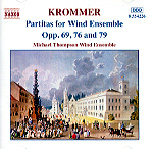When Franz Krommer wrote the three wind partitas presented on this recording (between 1808 and 1810) the Harmonie-Musik tradition was waning, making these some of the last examples of this once widely-practiced genre. Scored for pairs of oboes, clarinets, horns, and bassoons, they gain added ceremonial nobility with the addition of contra-bassoon. Listeners new to this music also will note the high, penetrating clarinet parts in C for the Op. 76 Partita and the many flamboyant arpeggio passages for second horn throughout Op. 69. Both techniques recall outdoor styles of the late 1700s.
These new performances by the Michael Thompson Wind Ensemble are of very high order and have been pleasingly recorded in a bright-sounding church acoustic that suits this extrovert music particularly well. This account of Op. 79 supplants an older analog version by the Nash Ensemble, with well-focused if quite closely miked sound and playing that’s more technically refined and better blended. Op. 76 has been recorded previously by the Meyer Wind Ensemble for EMI, but that performance is outclassed here by superior playing and a brilliant sense of comedy. For an enticing sample, try the final Rondo! Highly recommended.
































